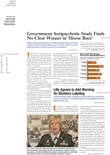How can we help? Where do we sign up to volunteer? What about licensure issues? What's happening with our colleagues and their patients?
These were just some of the numerous questions that members asked APA in the days after the extent of the devastation of Hurricane Katrina, and then Rita, became known.
And members weren't the only ones who inundated APA with questions through phone calls and e-mails. Also seeking information were psychiatry residents who had been training in the affected areas, displaced victims, and the media.
APA's Committee on Psychiatric Dimensions of Disaster (CPDD), chaired by Anthony Ng, M.D., worked quickly to coordinate APA's response to the disaster and open lines of communication between APA and federal and local agencies to ensure that the mental health needs of victims were being addressed. To provide information as quickly as possible, a clearinghouse of vital information and resources on psychiatric and mental health recovery services was created on APA's Web site and at press time was still being updated (Psychiatric News, October 7). It can be accessed directly at<www.psych.org/disasterpsych/katrina/resourcecenter.cfm>. The Web site serves as a central location for disseminating up-to-the-minute information to the public and keeping members, district branches and state associations (DB/SAs), and the public apprised of the latest communications on continuing volunteer and recovery efforts.
What was highly unusual about this disaster is that many APA members were personally affected by the storms. Many were left without homes and jobs and worried about their patients and ability to provide care. They shared their harrowing stories and how they managed to escape with no more than the clothes they were wearing. Some of these stories appeared in the last issue of Psychiatric News, and more appear on pages 5 and 6.
Because many disasters to which APA responds are outside the United States, the CPDD is staffed by APA's Office of International Affairs (OIA), under the direction of Darrel Regier, M.D., M.P.H. The staff liaison is Erin-Dalder-Alpher. She and the OIA have worked tirelessly since late August to help members and psychiatry residents affected by the storms and to organize APA's involvement in federal and local recovery efforts.
Assisting OIA in the creation and updating of the Web site, now named“ Hurricanes: APA's Response Effort,” are APA's Department of Information Systems and Office of Communications and Public Affairs.
Many other APA departments have contributed to the hurricane-response effort as well. The DB/SA Relations Office is helping to facilitate requests and inquiries from the DB/SAs, as well as provide support to the DBs directly impacted by the storms. The Office of Healthcare Systems and Financing is responding to licensure and credentialing questions from psychiatrists interested in volunteering their services. The Division of Education and Career Development is reaching out to psychiatry residents who have been displaced by the storms.
Other departments contributing to the response efforts include the Answer Center, American Psychiatric Foundation, American Psychiatric Publishing Inc., Office of Association Governance, Division of Advocacy, Office of HIV/AIDS, Library/Archives, Membership Department, Department of Minority and National Affairs, Department of Quality Improvement and Psychiatric Services, and the Division of Research/American Psychiatric Institute for Research and Education.
This disaster is predicted to have a lasting impact on the mental health of hundreds of thousands of people and will require the assistance of APA and our members for many months—and possibly many years—to come. In addition to continued collaboration with the Red Cross and the Federal Emergency Management Agency, Substance Abuse and Mental Health Services Administration (SAMHSA), and other federal agencies, APA is working with Westover Consultants on a special SAMHSA program designed to deploy psychiatrists to Louisiana and other regions as part of “Flexible Response Teams.” As of the first week of October, 52 APA members had volunteered for deployment through this program.
We should be proud of the stellar efforts of our members, DBs/SAs, and staff who have contributed to helping those harmed by this overwhelming event.
We will continue to report on APA's disaster-recovery efforts through the hurricane Web site and the pages of Psychiatric News. In a disaster of this magnitude, however, there is always more that needs to be done. Let me hear from you if you have additional ideas on how APA, either at the national or DB/SA level, can provide further assistance. ▪

